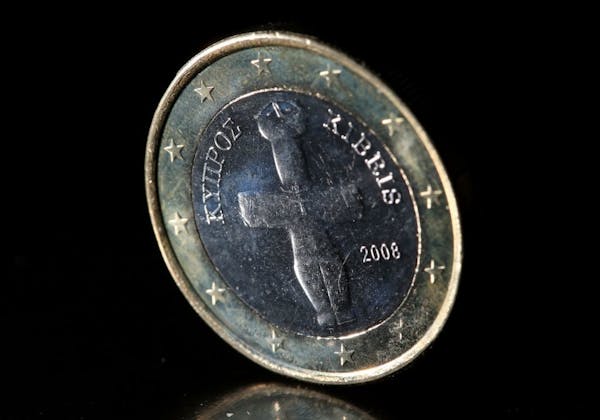Greece exported $26.7 billion in goods last year, led by food and beverages. For Cyprus, potatoes and citrus led a $1.9 billion export total.
Not counted in these official statistics, however, is what may have become each country's leading export: fear.
Within Europe, the fear is that their fiscal crises will endanger the future of the euro, which is the focus of this month's Minnesota International Center Great Decisions dialogue. Within the United States, the fear is that a continental contagion could cross the pond and ambush America's future, too.
This fear may be more about us than them, considering the modest economic impact of these countries on an American economy that exported $1.6 trillion worth of goods last year.
A recent Rasmussen poll reported that 66 percent of Americans "oppose Cyprus bailout plan to tax bank deposits." Another found that "46 percent think feds might try to tax bank accounts like Cyprus." Most remarkable aren't the polls' results, but the polls' existence: An obscure European nation had a significant impact on America's political and news narrative — just as Greece has had.
To be sure, there are economic reasons for the level of interest, among them "the flight to safety, incredibly low U.S. Treasury yields that have spilled over into low mortgage rates," said Chris Farrell, economics editor of American Public Media's "Marketplace Money" radio program. "But part of it is our political discourse. … The reason why we are so familiar with Greece is it's been used a lot as a code word, a catchphrase that suggests all kinds of things that don't have a whole lot to do with the euro. It's more … about trying to make a political point here in the United States."
The political point can eclipse the economic one, but there are positives, said V.V. Chari, professor of economics and founding director of the Heller-Hurwicz Economics Institute at the University of Minnesota, as well as an adviser to the Federal Reserve Bank of Minneapolis.
"By and large the reporting has been very factual, and I think that the focus of attention is good in the sense that it has allowed at least part of the discussion to focus on the long-run consequences of policies. All too often policy discussions are focused on the next three months, six months or the next election cycle. To the extent that contemporary developments get people to discuss issues that may become important five or 10 years down the road, I, as an economist, only applaud."
Chari might clap louder if key continental leaders listened, and learned, as intently as Americans seem to be doing.
"It's not so much 'are Americans paying attention to the Greeks?' but 'are Italians paying attention to the Greeks, and what lessons are the Italians drawing?' That might enrich the policy discussion much more."
It's notable that the cautionary tales from Cyprus and Greece, ground zero of the eurozone crisis, are much more prominent than the results from another European economic experiment: austerity. The lesson here is about timing, both Chari and Farrell said.
"It's 'austerity when?' " said Farrell, who added that bold tax hikes and spending reductions may be delayed because "on balance this economy is still pretty weak."
And compared with countries like England, "there are no proposals to dramatically raise taxes or slash spending in the next year or two," said Chari.
The blending of economics and politics isn't only a U.S. phenomenon, however. In fact, it may be the very reason the euro will survive.
Farrell is clear on the creation of the euro: "It was a mistake," he said. But "having created it, it's probably a bigger mistake to undo it." Then he turns to the long view:
"This is an incredibly heartening period of history. I'm not minimizing the unemployment, the trauma that's going on in Europe. But Europe in 100 years had three really horrible wars, and now what they are doing is talking each other to death — nobody has called out the tanks."
Chari points to European elites' "European project" as a fundamental factor in creating, and keeping, the euro.
"The European project is to make everyone think of themselves as Europeans first and then Dutch or Swedes. 'We want to avoid world war' — that was the original motivation. Most people, including me, think of those as very noble motivations.
"Lots of people ask 'why do the Greeks fight so hard and go through such stringent austerity — why don't they just quit?' That's the wrong question to ask. The interesting question is 'why do German taxpayers put up with giving money to the Greeks?' That's where the European project plays a very important role: All of them are engaged in a marriage that is going through really hard times. But because the European elites believe so much in the European project, absent some giant political revolution from ordinary people, I think the elites will fight very hard to keep Europe together, and they view the euro as a very important symbol of the European project."
So the answer to the future of a currency may best be found in asking: How do Europeans envision the future of their continent?
----------------
John Rash is a Star Tribune editorial writer and columnist. The Rash Report can be heard at 7:50 a.m. weekdays on WCCO Radio, 830-AM. The Star Tribune Editorial Board and the Minnesota International Center are partners in "Great Decisions," a monthly dialogue discussing foreign-policy topics.

Film festival shows the transformative power of art
NATO's strength in numbers makes U.S. more secure


